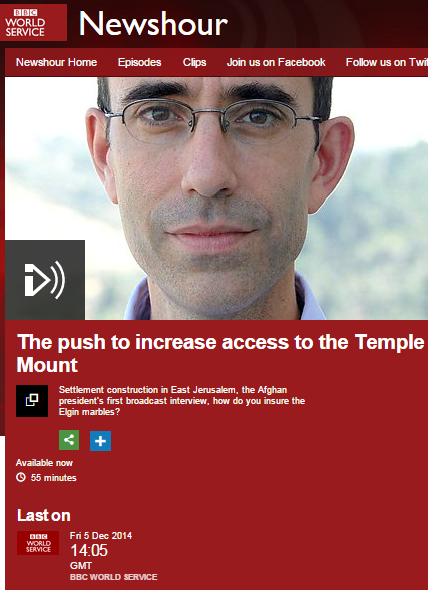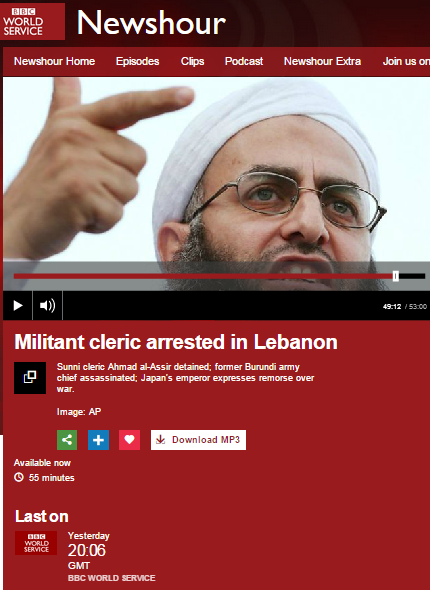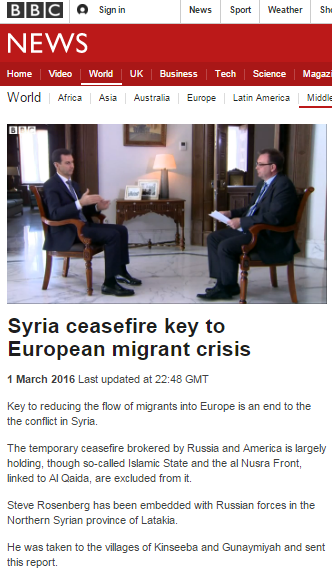“Well the BBC’s one of the few organisations that has permanent offices in Gaza, in Ramallah, in Jerusalem, so we are better placed than many to make sure that we report both sides of the story. Ah…we’re very careful about the language we use. We’re very careful about the interviews we do and ensuring we have balance in both points of view that are put across and also just the volume of interviews we do from both sides. […] we try to look at the entirety of our coverage. We’re not minute counting. We are ensuring that across the whole thing we can look back on our coverage of this and say we did give fair balance to each side.” (Source: BBC World Editor Andrew Roy, July 5th 2014)
Between July 8th and August 26th the BBC World Service’s flagship news and current affairs radio programme ‘Newshour’ devoted considerable attention to coverage of the conflict in Israel and the Gaza Strip in its two daily editions – each of which is broadcast twice, with a version also be being broadcast in the US on American Public Media stations. Episodes are also available on the internet for around a year after broadcast. According to the BBC, its World Service radio had a total weekly reach of 43 million people in 2011, with 1.7 million weekly listeners in the UK and 9.9 million weekly listeners in America.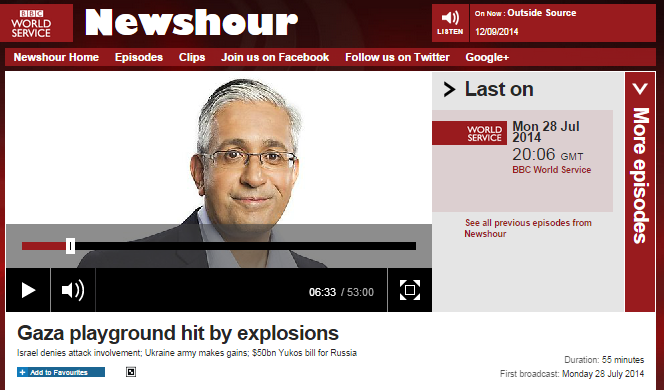
In this post we will take a look at one random but representative week of Newshour programmes (July 28th to August 3rd inclusive) in order to assess the accuracy of Andrew Roy’s above claims regarding “the language we use”, “balance in both points of view that are put across”, “the volume of interviews we do from both sides” and “fair balance to each side” as heard by the programme’s tens of millions of listeners.
On July 28th the programme’s evening version was presented by James Coomarasamy. The relevant seven and a half-minute section (00:38 to 08:10 in the link above) related mostly to incidents which had taken place a few hours earlier when misfired missiles launched by Palestinian terrorists hit a playground in Shati, killing ten people. Even though evidence presented by the IDF clearly showing the circumstances of the incident had been made public several hours before Newshour went on air, for more than two minutes at the beginning of the segment, listeners were led to believe that an Israeli attack had taken place.
James Coomarasamy: “After another brief truce the Eid al Fitr holiday has seen at least two airstrikes in Gaza itself as well as rocket fire going in the other direction. One of the attacks in Gaza was on the main al Shifa hospital, another on a playground. Ten Palestinians were killed in that second attack according to the health ministry in Gaza and it’s not hard to guess the sort of victims that you would find in a playground. Here’s an eye-witness.
‘There were seven children playing. They were hit and then they died on the spot. Another three men were sat over there and they were also hit. The children were playing and they were happy, enjoying Eid, and then they got blown to pieces.’ “
The segment then moved on to the BBC’s Martin Patience reporting from Shifa hospital, with both he and Coomarasamy perpetuating the myth of an Israeli ‘attack’ on the facility. Only at 02:55 were audiences informed of what Patience terms “conflicting claims” and “differing accounts”. Coomarasamy’s commentary continued with the inclusion of recordings from news conferences by the Israeli Prime Minister and the UN Secretary General. At 04:57 he introduced IDF Spokesman Peter Lerner who spoke for eleven seconds before the following Hamas statement was read out by a BBC staffer.
“Israeli occupation airplanes targeted earlier this evening a kids’ park in a refugee camp and a building in the Shifa hospital complex in the west of Gaza City. A police explosives engineering unit has examined the target places and found remains of Israeli shells fell in those places. The Israeli allegations that Palestinian rockets hit these places is not true and is a failed attempt to escape from the responsibility for these crimes and fear of scandal and legal prosecution.”
The programme then returned to Peter Lerner who related to the Shati incident for a further 44 seconds before Coomarasamy turned the conversation to other issues.
As we see, audiences heard Coomarasamy, Patience, an anonymous eye-witness and a Hamas statement promoting the inaccurate notion that Israel had attacked both a playground in Shati and Shifa hospital, compared to 55 seconds of clarification from the IDF spokesman.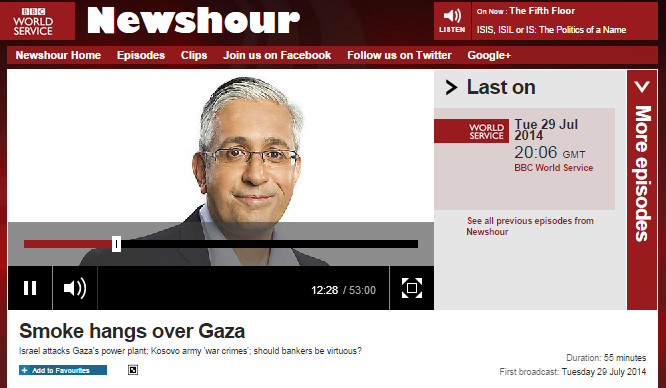
On July 29th the lunchtime version of Newshour (00:30 to 13:00) opened with presenter Rebecca Kesby saying:
“But first let’s go to Gaza where there’s been some of the most intensive bombing since the conflict began three weeks ago. Locals describe relentless bombardment. There’s been an enormous cloud of thick black smoke billowing over Gaza this morning. That’s from an Israeli airstrike on Gaza’s only power supply…power plant…overnight.”
The programme moved on to a report from the BBC’s Chris Morris in the Gaza Strip which includes the following entirely baseless allegation:
“And it is Gaza’s only power plant so there are electricity cuts in Gaza City, there could be problems with water supply because many of the area’s water pumps also rely on that power plant. So if that was a deliberate Israeli attempt to cause economic pain – which is certainly how most Palestinians will see it – then it could be fairly successful.”
The programme continued with Jon Donnison’s highly contentious presentation of a member of the PFLP from Beit Ummar as a charity worker – also promoted on BBC television news and on the website. After that, listeners heard a four-minute interview with Fatah’s Jibril Rajoub. No attempt was made in this programme to inform audiences with regard the situation in Israel.
The programme’s evening version (00:30 to 12:45) was presented by James Coomarasamy and it included a report from the BBC’s Martin patience in Gaza, an interview by Chris Morris with the deputy chair of Gaza’s energy authority Fathi el Sheikh Khalil and a six and a half-minute interview with anti-Israel activist Mads Gilbert during which – with more than a little help from Coomarasamy – the presence of Hamas officials in Shifa hospital was described to audiences as “a civilian administrator checking up, rather than the hospital used as a headquarters for Hamas”. Again, listeners heard nothing depicting the Israeli side of the story in this edition.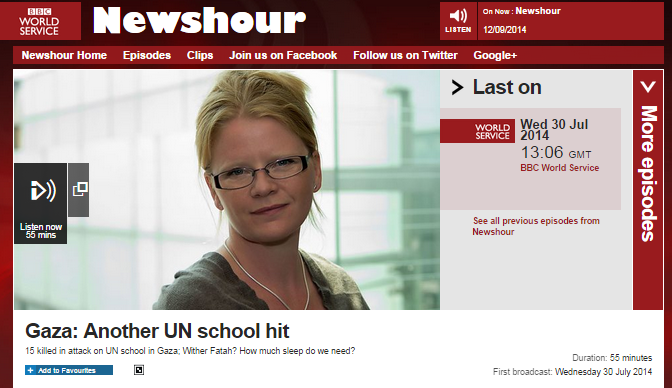
The afternoon version (00:50 to 12:45) of Newshour on July 30th was presented by Rebecca Kesby who opened:
“But first to Gaza and in recent days it’s been difficult to imagine how the situation could get any worse. Well today perhaps it did. A few hours ago, just before dawn, what appears to have been Israeli shells slammed into a United Nations school in the Jabaliya refugee camp.”
The programme continued with an emotive report from the BBC’s Chris Morris which included the following conversation with an unnamed woman:
Woman: “They didn’t kill any militant. They kill us. They kill us every day, every night. We cannot sleep, cannot eat, we can’t drink.”
Morris: “And there were no militants, no rockets in this school?”
Woman: “No, no, nothing. No militant, no weapons.”
There were, however, terrorists firing mortar rounds at Israeli troops in the vicinity of the school. Morris’ report also included an interview with Robert Turner of UNRWA, after which he closed with the following remarks:
“Israel says it is investigating and that its forces were fired upon form close to this school and responded. That’s not what the survivors say and it’s pretty hard to find any justification for what happened here.”
That was followed by a short interjection by Kesby and then further reporting by Morris in which he again claimed that there was no firing by terrorists from the vicinity of the school. Next came by a short emotion-laden interview with UNRWA’s Chris Gunness after which Kesby interviewed IDF spokesman Peter Lerner who began by informing her that mortar fire had been launched from near the school. Despite that, and clearly once again in armchair military expert mode, Kesby continued to promote the inaccurate notion that the school was the target of an attack.
“Was it targeted? Did you target this school?”
“But I mean there just seems to be such a contradiction there, doesn’t there? Because you say that you’re making surgical strikes, that you’re being careful not to involve civilian casualties. You say that you didn’t target this school but you did hit it, so does that mean that your targets are off site? That people who are operating your machinery, your weapons, aren’t being accurate in their targeting? What…what…has someone messed up here or did you deliberately target the school?”
“How long do you think some of your allies will be prepared to tolerate the scenes that we’ve seen today coming from Gaza whereby you have shells in classrooms, you have women crying over their dead children and that this is a UN facility. This is an embarrassment what happened today for Israel, isn’t it? How are you going to explain that to the international community?”
The programmes’s evening version (00:30 to 12:30), opened with presenter James Coomarasamy saying: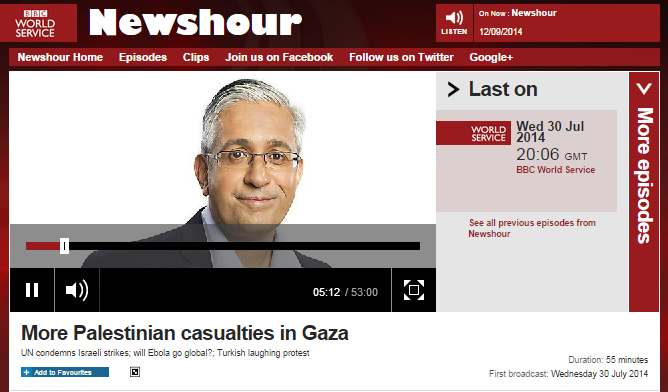
“But, we begin where we have begun all week – in Gaza – with a set of events that are becoming numbingly familiar. Palestinian health officials say at least 15 people were killed and more than 160 wounded in an Israeli airstrike on a crowded market in Gaza.”
Listeners then heard from a Hamas spokesman after which Coomarasamy returned to the Jabaliya incident, speaking to Jon Donnison – at the time still in Jerusalem – about both events. Donnison did at least clarify that the Shuja’iya district where the market is located was not included in the areas under a four-hour truce at the time. The programme continued with an interview with UN spokesman Farhan Haq which was followed by an interview with Israel’s former ambassador to the US, Michael Oren.
The July 31st lunchtime version (00:45 to 13:00) of Newshour was presented by Rebecca Kesby. The item included a report from Bethany Bell in Jerusalem presenting – for the first time in four days – an Israeli view of events. After that, Kesby interviewed Israeli MK Danny Danon, displaying some of her interpretation of the BBC’s famed ‘impartiality’.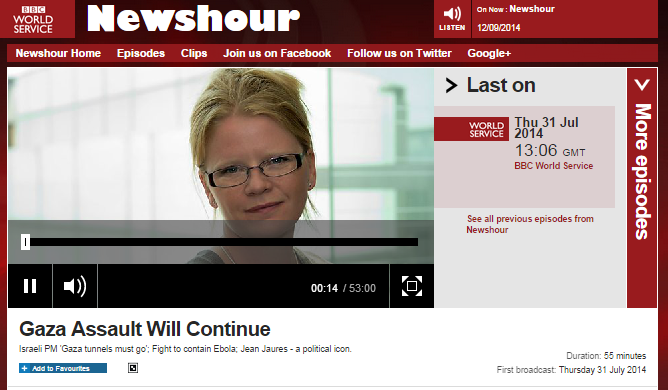
“You say it’s an insult that the Americans are asking you for a ceasefire, but do you not think that perhaps the Americans are asking you to show some leadership in Israel. I mean you’re a first world country…eh…you’ve got…you signed up to certain values. Shouldn’t you show some leadership and show the way forward?”
“But what the Americans and others across the world are seeing on their television screens are dead civilians and they’re seeing your artillery hitting schools and hospitals and the power supply and people see that as collective punishment against the Palestinians.”
Next Kesby showcased the opinion of an anonymous Hamas supporter in Gaza who claimed that “Hamas are struggling to lift the eight-year siege which has been imposed by the Israeli occupation and backed by the international community”. Kesby made no attempt to inform listeners that there is no siege on Gaza, that border restrictions were implemented as a consequence of Hamas terrorism or that the Gaza Strip is not occupied. She then interviewed Fawaz Gerges of the LSE on the topic of Hamas’ popularity.
The programme’s evening edition (00:24 to 13:00) opened with a statement from White House spokesman Josh Ernest concerning the incident in Jabaliya. Next came a report from the BBC’s Martin Patience in the Gaza Strip and that was followed by James Coomarasamy interviewing former PLO advisor Rashid Khalidi of Colombia university who was given four minutes in which to promote propaganda such as that below.
“My point is that this [cross-border attack tunnels] is not really what it’s about. Hamas uses tunnels – the Israelis claim of course to kill Israelis. What they have mainly been used for is to try and capture Israelis to exchange them for the many, many, many scores, hundreds, thousands of Palestinian prisoners who’ve been held – political prisoners I would add – for decades.”
“The whole point is that context, that background; that this is all taking place against a background of occupation. This is taking place against a background of blockade and siege. This is taking place against a background of every single time that there is an outburst of violence, scores of Palestinians die for every Israeli who dies, such that you have a disproportionate overwhelming imbalance in terms of the use of violence by Israel. All we hear about is Israeli casualties, Israeli concerns and so on.”
“Every time Israel has used its war machine against civilians, which it does regularly and systematically, they’re either totally imprecise or they’re trying to kill people. Those are the only two possibilities.”
The programme continued with an interview with Daniel Kurtzer – former US ambassador to Israel.
On August 1st the lunchtime version (00:00 to 10:00) of Newshour was presented by Rebecca Kesby who opened: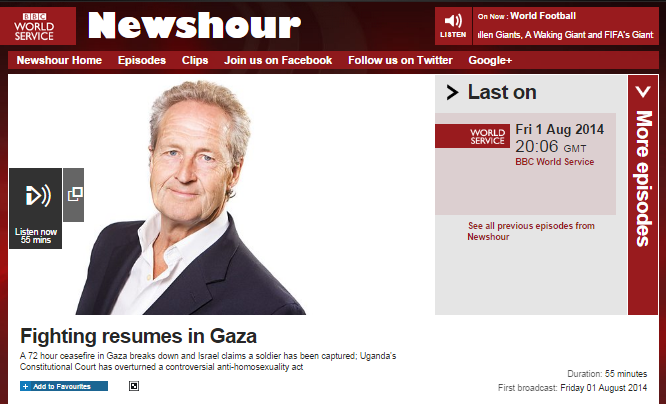
“And let’s start with the news from Gaza. And it was barely two hours in place before the humanitarian ceasefire collapsed.”
The item included a pre-recorded report by Jon Donnison in Beit Hanoun followed by a conversation between Kesby and Donnison about the breakdown of that day’s ceasefire. Kesby then spoke with the deputy secretary-general of Fatah Sabri Saidam who misrepresented the reasons for the breakdown of the truce.
The programme’s evening edition (00:24 to 13:00 and 30:00 to 39:15) was presented by Julian Marshall who informed listeners that “each side has accused the other of breaking the truce”. The item continued with a report by Jon Donnison which inaccurately portrayed the attack which breached the ceasefire as having taken place inside Israeli territory – as did Donnison’s television version of the same report – and Gilad Shalit as having been “captured in Gaza”.
Marshall went on to interview an Oxfam representative in the Gaza Strip followed by a 17 second-long recording of a statement made by the father of Hadar Goldin. Marshall’s next interviewee was Osama Hamdan of Hamas who misrepresented the circumstances of the truce’s breakdown. Next came a conversation with James Reynolds in Jerusalem presenting the Israeli view of the situation. Later on in the programme listeners heard from two Israelis – Ronit Keidar in Netiv HaAssera and retired Major General Giora Eiland.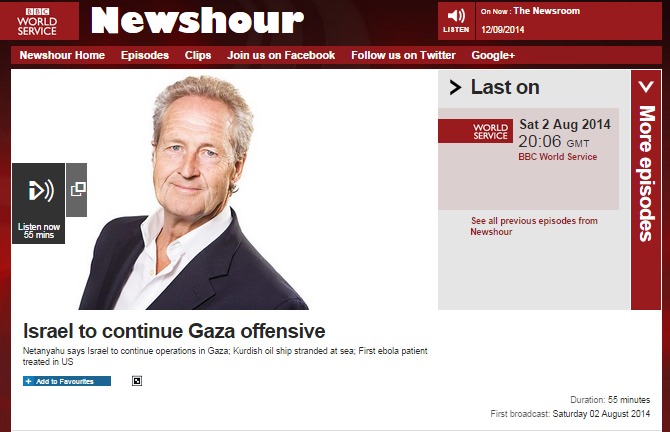
Julian Marshall also presented both editions of Newshour on August 2nd. The midday edition (00:30 to 10:30 and 45:00 to 47:45) began with unnamed residents of Gaza describing what Marshall terms “the death and destruction” and with the language used including “…it’s an extermination. An extermination.” Next came a report from the BBC’s Martin Patience in the Gaza Strip. Marshall then turned his attentions to the amplification of a story about an offensive article by an outside blogger on the Times of Israel website, even though it was removed and the blogger’s posting rights removed.
The programme continued with a report by the BBC’s Andrew Hoskin doing ‘man in the street’ interviews in Jerusalem and Tel Aviv. Later on listeners heard a report on the topic of ceasefire negotiations in Cairo from the BBC’s Mark Lowen.
In the evening version (00:30 to 13:30 and 26:30 to 36:00) of the programme Marshall interviewed Israeli Foreign Ministry spokesman Paul Hirschson and that was followed by a report from the BBC’s Martin Patience in Gaza. Next Marshall spoke with British politician Lynne Featherstone, pushing the topic of arms sales to Israel, promoting the notion of a “disproportionate” conflict and asking his interviewee:
“How many more Palestinians need to be killed before Britain, other Western governments start to be more strident in their criticism of Israel?”
Later on in the programme Marshall repeated the Times of Israel story and the Andrew Hoskin report featured in the programme’s earlier edition, introducing the latter item with the dubious claim that:
“…the overwhelming majority of Israeli Jews back the army’s offensive against Hamas: a view very much at odds with global public opinion.”
Marshall’s final interviewee was the PA’s representative in the UK, Manuel Hassassian who was given an undisturbed platform to promote his propaganda concerning a ‘siege’ and an ‘occupation’ which do not exist.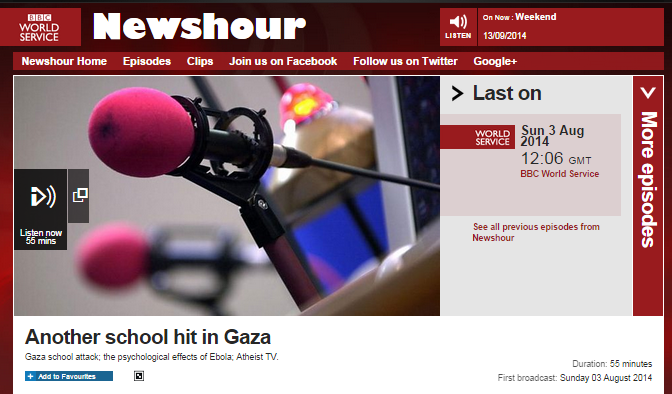
On August 3rd both editions of the programme were presented by Rebecca Kesby. In the lunchtime edition (00:30 to 12:54) Kesby opened by saying:
“But first to Gaza where this morning at least ten people were killed in an attack just outside a UN-run school in Rafah where displaced Palestinians were taking shelter from the fighting.”
The programme continued with a statement by UNRWA’s Robert Turner, after which Kesby spoke to IDF Spokesman Lt Col Peter Lerner, who tried time and time again to explain to her that he was not in a position to make a statement on what happened outside the school in Rafah because investigation of the incident (actually a strike on 3 PIJ terrorists) had not been completed at the time. Note how Kesby – who, as is clear from her above introduction, knew full well that the incident took place outside the school building – used manipulative language to turn it into an attack on a school. [emphasis added]
RK: “Well the UN seems pretty convinced that it was an Israeli shell that hit their school. Robert Turner has been saying that it’s now the third such facility of theirs that your forces have hit. He’s very cross. He says that the UN keeps telling the Israeli forces the precise location of all their facilities where people are going to take shelter and they keep being hit.”
RK: “People listening to this will be very cross to hear this again – just three days after another attack on a UN school which provoked widespread condemnation around the world. You talk about surgical strikes and precision bombing but the evidence is very different.”
“On the question of the UN-run school that was hit in Rafah this morning: when will you know if it was your rocket that killed those ten people and injured those 30 others?”
“Excuse me, sir, but you’re telling Palestinians to evacuate from their homes and seek shelter. They seek shelter at UN schools. You then bomb the schools. Whether it’s near the school or not, it’s not safe for them there, is it?”
During the same conversation, Kesby also amplified Hamas propaganda concerning Lt Hadar Goldin.
“But at the time you told people that he had been captured and this is something that Hamas have been saying was an attempt by you to try to manipulate the news agenda. Hamas leader Osama Hamdan said that Israel’s claims that the soldier was captured is to divert the public opinion to speak of the soldier instead of the Palestinians.”
The programme continued with UNRWA’s Chris Gunness talking about medical services in the Gaza Strip, followed by an interview with Dr Bassel Abuwarda who was allowed to promote the falsehood that Shifa hospital had been attacked by Israel a few days previously and to say:
“Most of the injuries that arrive in the hospitals are from children and women because they are bombing the houses while people are sleeping or while they inside. The majority of the population here in Gaza are children so imagine that you are bombing a house full with the children and women.”
The programme’s evening version (00:30 to 19:20 and 26:30 to 35:10) began with a statement by James Rawley of the UN who inaccurately claimed that 84% of those killed in the Gaza Strip were civilians. Next, Kesby spoke again to Lt Col Peter Lerner, once again indulging her hobby of amateur military strategist.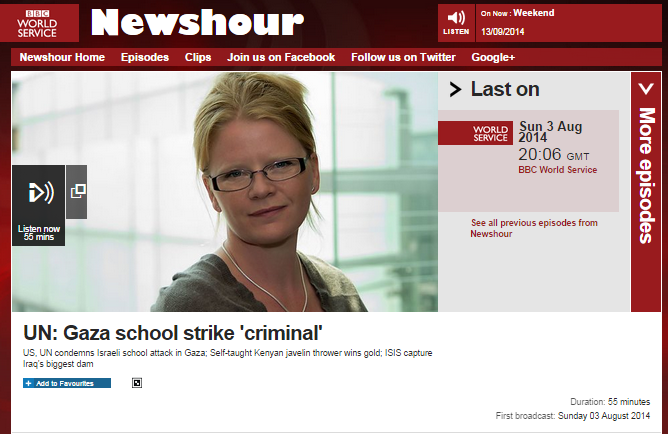
“But you’ve got 1,700 people dead, nine thousand injured – this is according to the UN – most of them civilians. If you’re so off target so often, should you just not stop firing your weapons?”
Kesby next interviewed Ahron Bregman of Kings College whose contribution was to suggest that Israel should not use artillery or “big” bombs in Gaza and after that the earlier interview with Dr Bassel Abuwarda was repeated. Later on in the programme Kesby returned to the topic of Gaza with a report by the BBC’s Andrew Hosken in which he interviewed two Israeli Arabs in Haifa – one of whom promoted the notion of increased “racism from some Jews” as a result of the conflict – and one man in what Hosken described as “East Jerusalem […] annexed from Jordan in the Six Day War in 1967” who was given an unchallenged platform to make the following claims.
“Well what’s happening in Gaza is a massacre, is a war crime that the Israelis are committing against children, against women, against old people. They are destroying everything, they are killing everybody. They are killers. They are vampires. They live on blood. This is my land, this is my home. This is my father land, my grandfather land, my grand, grand, grand, grand, grand, grandfather’s land. I have no place else to go.”
Kesby concluded with an interview with Arab Israeli author Sayed Kashua about his decision to leave Israel.
Throughout this particular week listeners heard BBC correspondents reporting four times on the Israeli side of the story and once on Arab Israeli views compared to nine reports by BBC journalists in the Gaza Strip. They heard from Israeli spokesmen five times and from other Israelis (including one leaving the country) on five additional occasions. UN officials presenting a Palestinian viewpoint were interviewed on seven occasions. Hamas spokespeople were featured three times and other Gaza functionaries four times. Fatah figures were interviewed on three occasions and anti-Israel activists and/or academics on four others.
In other words, in terms of what Andrew Roy describes as the “volume of interviews” and “ensuring we have balance in both points of view”, Newshour audiences were exposed to over twice as much material representing Palestinian viewpoints as they were to the Israeli side of the story, both in terms of guest interviewees and reports by BBC staff.
Whilst hours of coverage were devoted to depiction of the situation of the civilian population in the Gaza Strip, audiences were told very little indeed about how civilians in Israel fared during the same week – clearly debunking Roy’s claim of “fair balance to each side”.
With regard to Roy’s claim that “we’re very careful about the language we use” the performances of the three presenters of Newshour – and in particular Rebecca Kesby – demonstrated clear bias to the extent of the deliberate misleading of listeners with regard to the facts surrounding incidents and the presenters’ own political views were amply apparent.
Examination of Newshour’s output throughout the rest of the period between July 8th and August 26th shows that this sample week is entirely representative of that programme’s performance as a whole and prompts the very pertinent question of whether – beyond the type of platitudes voiced by Andrew Roy – the BBC actually has any sort of quality control mechanism in place to review and analyse its content and learn from the results.
Beyond the issue of adherence to BBC editorial guidelines on accuracy and impartiality (relevant not least because these programmes will still be available on the internet for months to come), the wider issue of the BBC’s contribution to the distortion of news and that practice’s contribution to manipulation of public opinion, even to the point of fostering hatred and racism. is a very relevant and topical issue which responsible news organisations should feel obliged to examine and address after their performance throughout this summer.
Related Articles:
‘From Our Own Correspondent’: a test case for BBC claims of ‘equal coverage’
‘Hardtalk’: a test case for BBC claims of ‘equal coverage’

